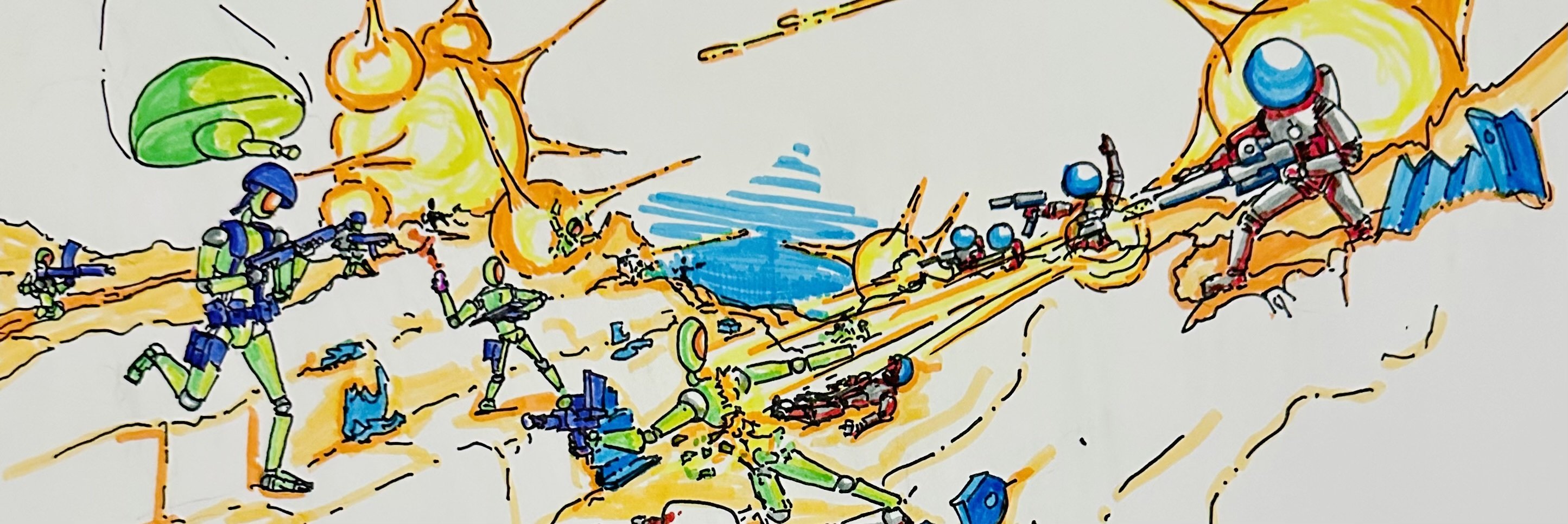I mod a worryingly growing list of communities. Ask away if you have any questions or issues with any of the communities.
I also run the hobby and nerd interest website scratch-that.org.
- 11 Posts
- 19 Comments

 20·16 days ago
20·16 days agoOne time I got an “in between” job at a local business. The first day I showed up and the place made me sign a 17 page front and back NDA.
I’ve signed actual, legitimate NDAs. They are like 3 pages, max. Some people are just preposterous.

 6·26 days ago
6·26 days agoKeep in mind Freelancer was released after Microsoft acquired Roberts’ company, kicked him out of a leadership role, and drastically slashed the scope.
Star Citizen is what happens when there is nobody above Roberts to say no, and now after years plenty of people under him with an interest in keeping the development churning.

 7·26 days ago
7·26 days agoPeople are buying the dream. There is personal investment now- this isn’t a game, this is their game. Supporters tend to talk like this is a community project, not a transaction between a customer and a studio.
Whenever the studio finally folds, I guarantee there will be whales lamenting that if they’d only spent a little more they’d have kept the game afloat.

 0·1 month ago
0·1 month agoWikipedia isn’t the end all, but in this case I think it provides a working definition.
Enshittification (alternately, crapification and platform decay) is a pattern in which online products and services decline in quality. Initially, vendors create high-quality offerings to attract users, then they degrade those offerings to better serve business customers, and finally degrade their services to users and business customers to maximize profits for shareholders.

 0·1 month ago
0·1 month agoThere’s a danger in any game where it might be largely designed and marketed to be one thing, and then has lengthy mandatory sections where it becomes another.
Poorly made stealth sections are a prime example. Game designers want to change things up, but if the game isn’t made to do stealth, it can easily turn into an annoying mess. There are a few (not a ton, but a few) games where the mandatory stealth sections are well liked, but they were made to carefully take advantage of the game’s strengths and knew when to end.

 0·1 month ago
0·1 month agoHold up, “enshitification” is just turning into a buzzword now.
Enshitification has from the beginning described a service or product which is first released one way, and then over time is made worse for the users in ways designed to squeeze more profit out of them.
Without some serious mental gymnastics, forced stealth sections tend to just be bad design choices. Not every bad thing is the same kind of bad thing.

 0·1 month ago
0·1 month agoIts an educated wish.

 0·1 month ago
0·1 month agoPersonally, I think Star Citizen is shallow and pedantic.

 0·1 month ago
0·1 month agoUnfortunately the good taste of people who actively comment about games often has only slight overlap with what makes money.
Three of the top ten US game earners in 2024 were yearly sports game rehashes. One of the top ten games was Call Of Duty. One was Fortnite.
These are money making machines. We can argue and beg and plead all we want. There is a huge mass of gamers out there was simply don’t care, and who will continue to buy formulaic rehashes and microtransaction infested treadmills.
The AAA publishers are not in it for the art. Look at AA and indie if you want games that are willing to appeal to a niche. I’m talking to you and everyone else reading this because this might actually have an effect. Saying what AAA publishers and developers should do is pointless, not like they will ever read it.

 0·1 month ago
0·1 month agoOh boy. Time for an 800 comment long flamewar about Star Citizen. I’m ready.

 0·2 months ago
0·2 months agoUnironically, I would play this.
Wasteland 3 is a good CRPG style game with modern presentation. There is backstory from the first two games, but the third one is self contained enough that you won’t be confused by the story.
I think making regions safe is a great idea but I would want it tied to a challenging side quest. Like maybe you can intentionally fight a harder version of an area’s enemies to make it safe?
That’s one way to tackle it. The point is that there is something to prevent the experience of being super high level and getting mugged by guys with rusty shivs. I’m throwing out many ideas, which could be refined by specific games.
When it comes to random mobs, a game which relies on them is Kenshi, as an example. Without wandering random mobs to encounter, the game loses a lot of flavor. Kenshi does a few things uniquely, with the main one being that many random encounters that end in defeat don’t end in death. Rather than it being a case where a random mob annoyingly forces a start from a previous save, Kenshi can often be played past the defeat with the player now enslaved, in jail, or injured. The emergent story telling from those fights is what makes the game.
Not every mechanic fits every game (obviously). With that in mind, rarely is any specific design choice always 100% good or bad.
I think rather than just taking a vote, it is more useful to think about what makes a good random encounter, and what kinds of game designs work well with them.
I enjoy CRPGs. Often in these random encounters happen when moving through an overworld. This kind of design doesn’t disrupt exploration, since once it is over, you continue on your way. It does disrupt when you are going between known points and just trying to tie something up. That can be annoying. Ways that I think can make random encounters enjoyable for CRPG styled games:
-
Not every random encounter has to be combat. Some can be combat, some can be social, some can be vendors, and some can just be flavor. Non-combat encounters can be used as sort of optional bonus content for players to learn about the lore or explore, and they might even feel special since it is a random occurrence the player gets.
-
The ability to put points into some kind of skill that gives the player the option to avoid a random encounter and/or start a combat encounter with a bonus.
-
Encounters should be tied with regions of the overworld in a way that makes sense. Put tougher encounters in endgame areas to discourage players from poking around too early. Make encounters in certain areas tied to the main faction or location in that area.
-
Ease up on certain kinds of encounters as the game goes on, so they don’t outstay their welcome. For example, in the early game if there are lots of low level bandits attacking in random encounters, it can be fun, but it gets old once you are powerful enough to rip through them and are just trying to get bigger things done. Solve this by, for example saying that routes between major hubs are secured thanks to player actions. Now the player can travel between main routes without getting hassled.
-
Be very thoughtful about combat random encounters triggered by NPCs after the player due to player actions. These tend to be more annoying since these are usually higher level NPCs that pack more punch. Making their appearance totally random can be very annoying. It also often feels like a grind if the encounter happens repeatedly. I would prefer the consequences of player actions to firstly always be telegraphed so they know a certain action means a revenge squad is after them. Second, I would prefer this encounter to be scripted- either concretely in a specific location where the game knows the player hasn’t yet been, or in a floating fashion where one of various possibilities is chosen by the game based on whatever triggers first. Once the player defeats whoever is after them, they should never be chased by an identical kind of threat.
-

 0·1 year ago
0·1 year agoI suppose I should have elaborated.
Chris Roberts begin developing Freelancer with a similar aspiration of total simulation that Star Citizen now promises.
Freelancer repeatedly overshot development timelines and Roberts was running out of money. He had to go to Microsoft for cash. Microsoft gave money to develop Freelancer in exchange for Roberts being essentially demoted to a consultant, and Microsoft taking charge. Microsoft immediately began cutting features and mechanics to turn Freelancer from an amorphous project into a shippable game.
If you know that, then seeing Roberts in charge of a new game, with no oversight and essentially infinite development time, the resulting quantum superposition state of Star Citizen’s release should not be surprising.

 0·1 year ago
0·1 year agoNo, there’s really no excusing this game’s development. If anything, Robert’s should have learned from Freelancer to have a tight core product that’s actually shippable.
At this point Internet nerds are locked into throwing money at Star Citizen’s development, making it the closest thing humanity has achieved to a perpetual motion machine.

 0·1 year ago
0·1 year agoI’ve been part of some amateur game dev projects and SC has the vibe of an amateur project where the devs are constantly focusing on whatever catches their fancy at the moment, going back and tinkering with things they’ve already made, and sort of aimlessly scope creeping. There’s nobody to strongarm them into writing, much less following a game design document.
All of that is intuitive to me to understand.
Then there is “the dream” that is being sold to people who want this type of game. That level of very specific fandom is also easy to understand, at least from a distance. People get super into all kinds of games and spend outsized amounts of money and time.
Star Citizen is like the perfect storm of these elements.












Those were both side games. Like how Fallout New Vegas isn’t Fallout 4.